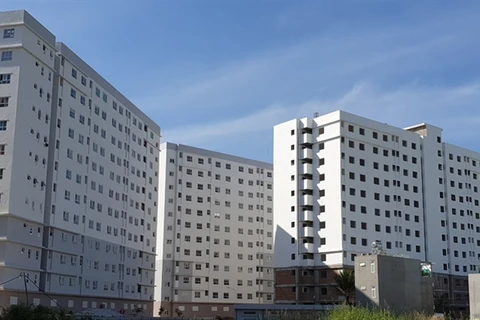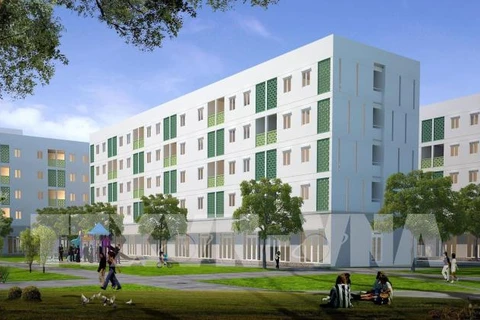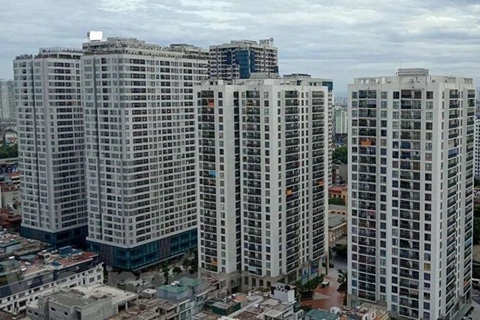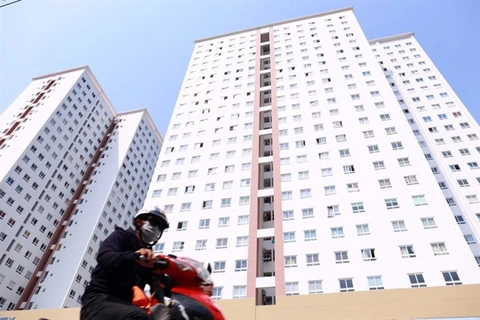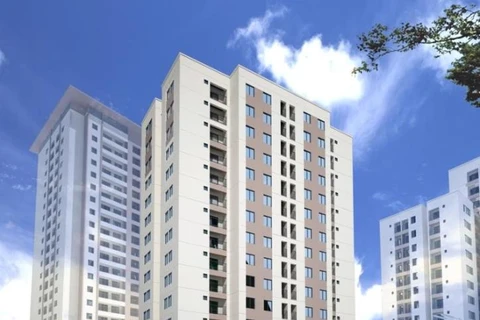Hanoi (VNA) - The supply of affordable housing for low-income earners in urban areas and industrial park workers has only met around 42 percent of the target, Bui Xuan Dung, Director of the Ministry of Construction’s Housing and Real Estate Market Management Agency, told a recent workshop.
A lack of available land and funding were to blame for the social housing shortage, Dung told the “Social Housing: The Establishment of the 2021 - 2030 Comprehensive Social Housing Policy in Vietnam” workshop on April 20 in Hanoi.
The urban population is on the rise and likely to reach 47.25 million, or 44.45 percent of the country’s total, in 2030. By that time, Vietnam will have one city of more than 10 million people, one of 5-10 million, and four of 1-5 million. Rapid urbanisation, though positively impacting socio-economic development, has put enormous pressure on housing, particularly for those on low incomes, he noted.
To boost social housing development around the country, the Korea International Cooperation Agency (KOICA) shook hands with the Ministry of Construction to launch a project on establishing the 2021 - 2030 Comprehensive Social Housing Policy, funded by non-refundable aid from the Republic of Korea (RoK).
The project aims to learn from international experience and explore the current situation in Vietnam to propose suitable policies for affordable housing development over the next decade and meet the growing demand.
A number of proposals, including those regarding land banks, the reform of procedures for social housing purchasing, renting, and “rent-to-buy” schemes, and incentives for developers have been put forward and translated into reality.
Kim Youin from the RoK Embassy in Vietnam said policies for social housing development need to be implemented in the long term and under a specific roadmap. The Government should also develop exclusive mechanisms and policies for people without financial means to access an appropriate social housing model, he said./.
A lack of available land and funding were to blame for the social housing shortage, Dung told the “Social Housing: The Establishment of the 2021 - 2030 Comprehensive Social Housing Policy in Vietnam” workshop on April 20 in Hanoi.
The urban population is on the rise and likely to reach 47.25 million, or 44.45 percent of the country’s total, in 2030. By that time, Vietnam will have one city of more than 10 million people, one of 5-10 million, and four of 1-5 million. Rapid urbanisation, though positively impacting socio-economic development, has put enormous pressure on housing, particularly for those on low incomes, he noted.
To boost social housing development around the country, the Korea International Cooperation Agency (KOICA) shook hands with the Ministry of Construction to launch a project on establishing the 2021 - 2030 Comprehensive Social Housing Policy, funded by non-refundable aid from the Republic of Korea (RoK).
The project aims to learn from international experience and explore the current situation in Vietnam to propose suitable policies for affordable housing development over the next decade and meet the growing demand.
A number of proposals, including those regarding land banks, the reform of procedures for social housing purchasing, renting, and “rent-to-buy” schemes, and incentives for developers have been put forward and translated into reality.
Kim Youin from the RoK Embassy in Vietnam said policies for social housing development need to be implemented in the long term and under a specific roadmap. The Government should also develop exclusive mechanisms and policies for people without financial means to access an appropriate social housing model, he said./.
VNA

